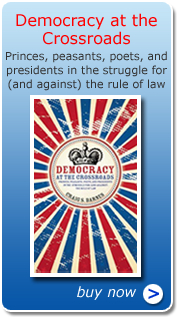In the 17th century when the eastern seaboard was still a colony of England, King Charles I, who was then our king, asked his subjects to loan him money and when they refused he threw them in jail. He did so in great numbers. “Pay for my wars or rot,” said Charles.
No law had ever been passed that required a man to make loans to the king, so hundreds of fellows were rotting in cells without conviction. The ancient legal writ of habeas corpus was supposed to protect them because it gave to prisoners the right to know why and under what law they were sentenced. To which the King had replied, “Fie upon habeas corpus!”.
Now, again, today almost four hundred years later, come certain inmates at Guantanamo prison to say to George W. Bush, “The US constitution says that habeas corpus may not be suspended except in times of rebellion or invasion. That means that the government must tell us why, under what law or for what crime, we are held. Like those men that King Charles put in prison, we also have a right to be tried under the law and if not convicted, then freed.”
Like a good many kings before him, George Bush has mightily resisted these prisoners who seek the application of law to their cases. King John I, in the 13th century, tried to deny something akin to habeas corpus, so too, King Edward III in the 14th century, and Elizabeth I in the 16th, and Charles I, and Charles II and James II all in the 17th. Kings simply don’t like to be told how to handle people whom they think are dangerous. Unfortunately for the rest of us, kings are apt to think nearly anyone might be dangerous.
The founders of this country therefore wrote habeas corpus into the main body of our Constitution as an explicit prohibition against a powerful president who might throw people in jail on his own motion. The writ was not some jargon, or empty concern from philosophical texts. Habeas went into Article I of our constitution even before rights of free speech and assembly or due process which followed some years later. Habeas was, that is, at the very core, and it was the core because it was the mechanism by which to keep powers in balance. Habeas was not some idle principle to allow the rag tag of prisons to complain and wail of their plight. Much more than this, if prisoners could be jailed by a president without recourse to the law, presidents could do anything, and presidents who could do anything were apt to think like kings.
This spring the Guantanamo case came to the Supreme Court. The pressure upon the Justices was enormous. In an historic opinion, the court found for the prisoners. The four conservative justices, however, wrote a scathing dissent, sounding much the same as those who had defended Charles I before he was beheaded or James II before he was exiled. In this case, Justices Roberts, Scalia, Alito and Thomas threatened Kennedy and the country with the specter of foreign attacks, danger and plunder if the president power to imprison were not supported. I have been reading supreme court opinions for most of my life. I do not remember reading so filled with scorn as those of Justices Roberts and Scalia in this case.
Justice Anthony Kennedy, for the majority, withstood these attacks. To his great credit he wrote that neither the president nor congress may deprive a prisoner in Guantanamo the right to know why he is in there and under what law. Habeas corpus will have no sovereign.
Those who value the rule of law above the rights of the king must today consider Anthony Kennedy a hero. He was treated by his conservative colleagues—with whom he has often stood united—as if he were a traitor. He nevertheless wrote an opinion citing the evolution of habeas from the time of King John, more than 800 years ago and marched the tradition forward to the present day. By the narrowest of margins, Justice Kennedy and his four colleagues in the majority gave us a decision that shall go down in history as a triumph. They held that the law is above the will of the powerful who imagine that unilateral rule is their right. They held firm in the ages-long struggle to make this country, or any country, a place where the law, not whim, or fear, or patriotic drum pounding, shall prevail.
